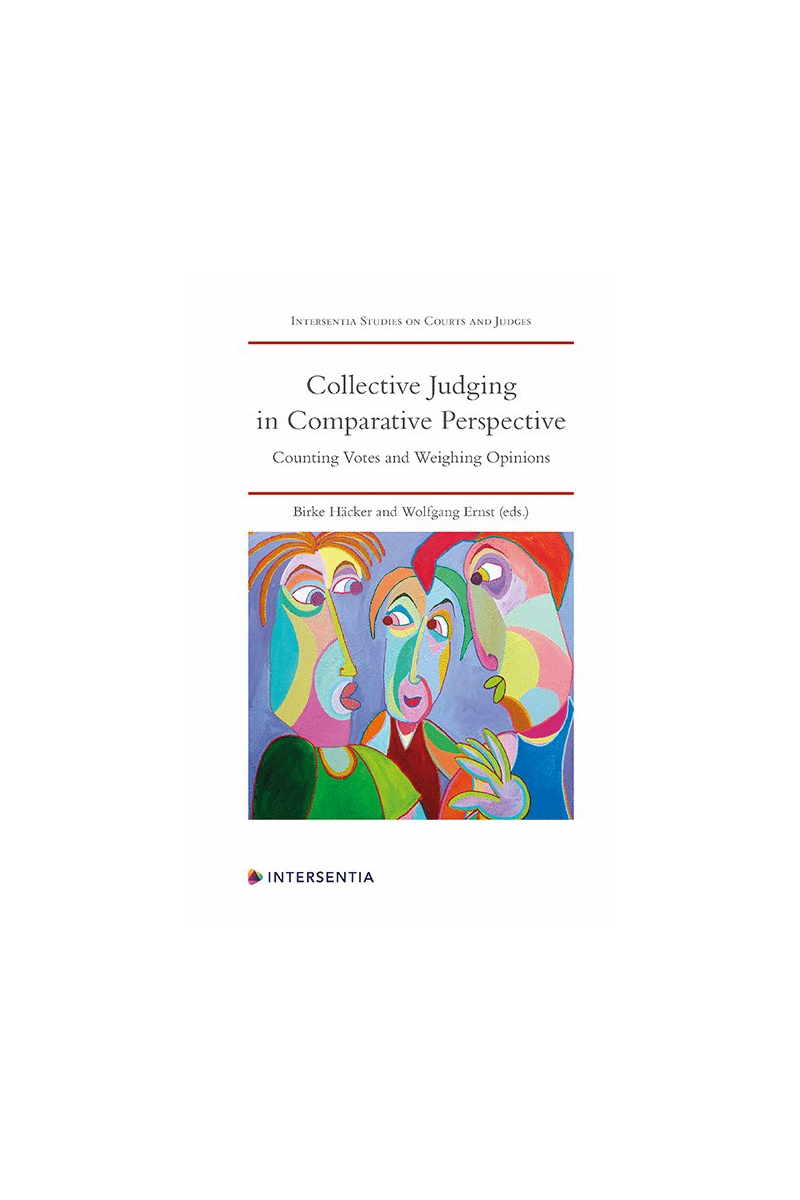 maestro
mastercard
visa
maestro
mastercard
visa

Collective Judging in Comparative Perspective
Counting Votes and Weighing Opinions

This book provides insight into modern collective judicial decision-making. Courts all over the world sit in panels of several judges, yet the processes by which these judges produce the courts’ decisions differ markedly. Judges from some of the world’s most notable judicial bodies, in both the civilian and the common law tradition and from supra-/international courts, share their experiences and reflect on the challenges to which their collective endeavour gives rise. They address matters such as the question of panel constitution, the operation of rapporteur systems, pre- and post-hearing conferences, the hearing procedure itself, the nature of the interaction between the judicial panel and parties’ advocates, the extent to which a unitary judgment of the court or at least a single majority judgment is required or deemed desirable, and how it is ultimately arrived at through different voting mechanisms. The judicial views are supplemented by a number of academic commentaries. Collective Judging in Comparative Perspective serves as an inspiration for future court design.
______
Sir Jack Beatson (formerly Court of Appeal of England and Wales)
Thomas von Danwitz (Court of Justice of the European Union)
Matthew Dyson (University of Oxford)
Harry T Edwards (United States Court of Appeals for the DC Circuit)
Wolfgang Ernst (University of Oxford)
Kevin Garnett QC (formerly Boards of Appeal of the European Patent Office)
Msgr Markus Graulich (Pontifical Council for Legislative Text)
Beate Gsell (Ludwig-Maximilians-Universität Munich)
Birke Häcker (University of Oxford)
Dominique Hascher (Cour de cassation)
Sir Launcelot Henderson (Court of Appeal of England and Wales)
Richard Hyland (Rutgers Law School)
Susan Kiefel AC (High Court of Australia)
Georg Kodek (Austrian Supreme Court)
James Lee (King’s College London)
Sir Keith Lindblom (Court of Appeal of England and Wales)
Gertrude Lübbe-Wolff (formerly German Federal Constitutional Court)
Theodor Meron (International Residual Mechanism for Criminal Tribunals)
Angelika Nussberger (formerly European Court of Human Rights)
Akira Ojima (Chief Judicial Research Official, Supreme Court of Japan)
Naoki Onishi (Otsu District Court, Japan)
Christos Ravanides (Office of Legal Affairs, United Nations)
Lord Reed of Allermuir (Supreme Court of the United Kingdom)
Thomas Rüfner (University of Trier)
Johanna Schmidt-Räntsch (German Federal Court of Justice)
Thomas Stadelmann (Swiss Supreme Court)
______
WOLFGANG ERNST is Regius Professor of Civil Law, University of Oxford, and Fellow of All Souls College.
BIRKE HÄCKER is the Professor of Comparative Law, University of Oxford, and Fellow of Brasenose College.
| Type de produit | Livre |
|---|---|
| Format | Livre relié |
| EAN / ISSN | 9781780686240 / 9781839700804 |
| Nom de la collection | Intersentia Studies On Courts And Judges |
| Poids | 790 g |
| Disponibilité | En stock |
| Nombre de pages | xxii + 344 p. |
| Avec exercice intégré | Non |
| Editeur | Larcier |
| Langue | Anglais |
| Date de publication | 31 août 2020 |
| Disponible sur Strada Belgique | Non |
| Disponible sur Strada Europe | Non |
| Disponible sur Strada Luxembourg | Non |
Téléchargements
- Table of contents and preliminary pages
- Part I. Designing Collegiate Courts' Decision-Making Processes
- Chapter 1. The Fine-Mechanics of Judicial Majoritarianism
Wolfgang Ernst - Part II. Collegiate Courts in the Common Law Tradition
- Chapter 2. Collective Judging in the UK Supreme Court
Robert Reed - Chapter 3. Collective Judging in the Court of Appeal of England and Wales
Jack Beatson, Launcelot Henderson, Keith Lindblom (Sir) - Chapter 4. An Australian Perspective on Collective Judging
Susan Kiefel - Chapter 5. Collegial Decision-Making in the US Courts of Appeals
Harry Edwards - Part III. Collegiate Courts in the European Civil Law Tradition
- Chapter 6. Collective Judging in the French Cour de Cassation
Dominique Hascher - Chapter 7. Collective Judging in Germany
Johanna Schmidt-Räntsch - Chapter 8. Why is the German Federal Constitutional Court a Deliberative Court, and Why is That a Good Thing? A Comparative Assessment
Gertrude Lübbe-Wolff - Chapter 9. Collective Judging at the Swiss Supreme Court
Thomas Stadelmann - Chapter 10. Decision-Making in Appellate Courts: An Austrian Experience
Georg Kodek - Part IV. Collegiate Courts in a Non-European Civil Law Jurisdiction: The Case of Japan
- Chapter 11: Collective Judging by Collegiate Courts in Japan
Akira Ojima, Naoki Onishi - Part V. Supranational and International Collegiate Courts
- Chapter 12: The Fine-Mechanics of Judicial Decision-Making at the European Court of Human Rights
Angelika Nussberger - Chapter 13: Collective Judging in the Court of Justice of the European Union
Thomas von Danwitz - Chapter 14: The Anatomy of the Deliberation Process at International Criminal Tribunals
Theodor Meron - Chapter 15: Collective Judging in the Catholic Church
Markus Graulich - Part VI. Voices from the Audience and Closing Remarks
- Chapter 16: Decision-Making by the Boards of Appeal of the European Patent Office
Kevin Garnett - Chapter 17: Collegiality and Collectivity in Common Law Courts
James Lee - Chapter 18: Should Judges Tell Us What They Think?
Richard Hyland - Chapter 19: Beyond Anecdote and Synecdoche
Matthew Dyson - Chapter 20: Concluding Remarks
Wolfgang Ernst, Beate Gsell, Birke Häcker, Thomas Rüfner